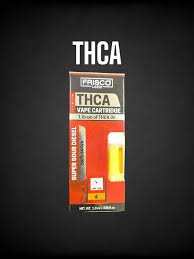Sweden’s Growing Appetite for Natural Wellness
Swedes are known for embracing balanced lifestyles. From saunas to forest bathing, the nation has always celebrated natural approaches to health. Over the past decade, cannabis-derived products have quietly joined this wellness movement. CBD oils, hemp teas, and topical creams have become staples for many.
Now, a new compound—THCA—is capturing attention. Unlike THC, it is non-psychoactive in its raw state, yet research suggests it could support wellness in unique ways. For Swedish consumers, THCA vapes represent both an exciting opportunity and a complex challenge.
What Makes THCA Different From THC?
Cannabis contains over 100 cannabinoids, each with distinct effects. THC is infamous for producing euphoria, while CBD gained popularity as a calming, legal option. THCA, or tetrahydrocannabinolic acid, occupies a unique middle ground.
It is the precursor to THC, present in raw cannabis before heat changes its structure. THCA does not intoxicate, making it appealing for wellness users. But with heat—through vaping or cooking—it transforms into THC. This dual nature explains why THCA is fascinating but also legally tricky.
How THCA Vapes Work – A Wellness Tool With Limits
Vaping is seen as a modern, cleaner way to consume cannabis derivatives. Instead of smoke, vapes deliver vaporized cannabinoids at controlled temperatures. For THCA, this offers a pathway to absorb the compound without immediate intoxication.
However, temperature control is everything. If a device heats too much, THCA becomes THC. In Sweden, where THC is strictly illegal, this presents a significant risk. For consumers, a THCA vape is both an opportunity for wellness and a potential legal hazard.
Sweden’s Legal Environment – Strict But Shifting
Sweden enforces strict drug laws, particularly regarding cannabis. THC remains fully prohibited, with penalties for possession and use. No exceptions are made for medical purposes, unlike in some European countries.
THCA, however, exists in a legal grey zone. Since it is non-psychoactive, it is not directly scheduled. Still, regulators treat it cautiously due to its ability to transform into THC. This means consumers face uncertainty: a product marketed as THCA may still attract legal scrutiny.
The Wellness Potential of THCA
Scientific studies, though early, suggest THCA could support human wellness in several ways:
-
Anti-inflammatory support: May reduce swelling and discomfort from chronic conditions.
-
Neuroprotection: Could help preserve brain health.
-
Anti-nausea relief: May ease digestive challenges and treatment side effects.
-
Appetite stimulation: Could support recovery for those struggling with low appetite.
These potential benefits align with Sweden’s natural wellness culture. Still, research remains ongoing, and consumers should balance enthusiasm with realistic expectations.
Risks of THCA Vapes in Wellness Practices
While promising, THCA use is not without risks:
-
Conversion into THC could cause intoxication and legal issues.
-
Unregulated products may contain harmful contaminants.
-
Legal ambiguity leaves consumers exposed to enforcement uncertainty.
These risks underline why Swedish consumers must prioritize safety and compliance in their wellness journeys.
Shopping for THCA Vapes in Sweden
Responsible shopping is essential. Consumers should:
-
Demand third-party lab results to confirm purity and THC absence.
-
Trust reputable vendors with a focus on safety.
-
Avoid cheap products with unclear origins.
-
Stay informed about Swedish cannabis regulations.
A reliable vendor for consumers is THCA Sverige




